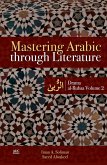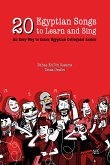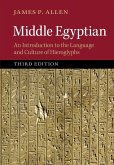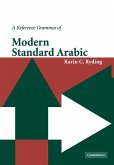Nevenka Korica Sullivan
Advanced Arabic through Discussion
16 Lessons on Contemporary Topics with Integrated Skills and Fluency-building Activities for MSA Learners
Nevenka Korica Sullivan
Advanced Arabic through Discussion
16 Lessons on Contemporary Topics with Integrated Skills and Fluency-building Activities for MSA Learners
- Broschiertes Buch
- Merkliste
- Auf die Merkliste
- Bewerten Bewerten
- Teilen
- Produkt teilen
- Produkterinnerung
- Produkterinnerung
A creative approach to Arabic language learning through lively topical discussion
Andere Kunden interessierten sich auch für
![Mastering Arabic through Literature Mastering Arabic through Literature]() Iman A. SolimanMastering Arabic through Literature42,99 €
Iman A. SolimanMastering Arabic through Literature42,99 €![20 Egyptian Songs to Learn and Sing 20 Egyptian Songs to Learn and Sing]() Bahaa Ed-Din Ossama20 Egyptian Songs to Learn and Sing36,99 €
Bahaa Ed-Din Ossama20 Egyptian Songs to Learn and Sing36,99 €![Middle Egyptian Middle Egyptian]() James P. Allen (Rhode Island Brown University)Middle Egyptian69,99 €
James P. Allen (Rhode Island Brown University)Middle Egyptian69,99 €![A Reference Grammar of Modern Standard Arabic A Reference Grammar of Modern Standard Arabic]() Karin C. Ryding (Washington DC Georgetown University)A Reference Grammar of Modern Standard Arabic90,99 €
Karin C. Ryding (Washington DC Georgetown University)A Reference Grammar of Modern Standard Arabic90,99 €![The Ancient Egyptian Language The Ancient Egyptian Language]() James P. Allen (Rhode Island Brown University)The Ancient Egyptian Language40,99 €
James P. Allen (Rhode Island Brown University)The Ancient Egyptian Language40,99 €![Teaching Arabic as a Foreign Language Teaching Arabic as a Foreign Language]() Andrea FacchinTeaching Arabic as a Foreign Language174,99 €
Andrea FacchinTeaching Arabic as a Foreign Language174,99 €![The Routledge Course on Media, Legal and Technical Translation The Routledge Course on Media, Legal and Technical Translation]() Mahmoud AltarabinThe Routledge Course on Media, Legal and Technical Translation51,99 €
Mahmoud AltarabinThe Routledge Course on Media, Legal and Technical Translation51,99 €-
-
-
A creative approach to Arabic language learning through lively topical discussion
Produktdetails
- Produktdetails
- Verlag: The American University in Cairo Press
- Seitenzahl: 240
- Erscheinungstermin: 1. Januar 2021
- Englisch
- Abmessung: 221mm x 153mm x 22mm
- Gewicht: 380g
- ISBN-13: 9789774168826
- ISBN-10: 9774168828
- Artikelnr.: 53486490
- Herstellerkennzeichnung
- Libri GmbH
- Europaallee 1
- 36244 Bad Hersfeld
- gpsr@libri.de
- Verlag: The American University in Cairo Press
- Seitenzahl: 240
- Erscheinungstermin: 1. Januar 2021
- Englisch
- Abmessung: 221mm x 153mm x 22mm
- Gewicht: 380g
- ISBN-13: 9789774168826
- ISBN-10: 9774168828
- Artikelnr.: 53486490
- Herstellerkennzeichnung
- Libri GmbH
- Europaallee 1
- 36244 Bad Hersfeld
- gpsr@libri.de
Nevenka Korica Sullivan
1. Introduction
2. Discussion 1: Should Antiquities Be Repatriated?
3. Discussion 2: Should the Medium of Instruction at Arab Universities be
Arabic or English?
4. Discussion 3: What Are The Pros and Cons of Advertising?
5. Discussion 4: Are you for or against Banning Books?
6. Discussion 5: Is Graffiti Art or Vandalism?
7. Discussion 6: Are You for or against Zoos?
8. Discussion 7: Do Universities Need Dress Codes?
9. Discussion 8: What is More Effective in Fighting Injustice: Violence or
Non-Violence?
10. Discussion 9: Are Talent Shows Good or Bad?
11. Discussion 10: Can Rap Music Be an Agent of Change?
12. Discussion 11: Should Dangerous Sports Be More Regulated?
13. Discussion 12: Do Celebrities Have Privacy Rights?
14. Discussion 13: Should Dangerous Sports Be More Regulated?
15. Discussion 14: Why Do People Believe in Conspiracy Theories
16. Discussion 15: Is Alternative Medicine Science or Quackery?
17. Discussion 16: Is Economic Development More Important than the
Protection of the Environment?
2. Discussion 1: Should Antiquities Be Repatriated?
3. Discussion 2: Should the Medium of Instruction at Arab Universities be
Arabic or English?
4. Discussion 3: What Are The Pros and Cons of Advertising?
5. Discussion 4: Are you for or against Banning Books?
6. Discussion 5: Is Graffiti Art or Vandalism?
7. Discussion 6: Are You for or against Zoos?
8. Discussion 7: Do Universities Need Dress Codes?
9. Discussion 8: What is More Effective in Fighting Injustice: Violence or
Non-Violence?
10. Discussion 9: Are Talent Shows Good or Bad?
11. Discussion 10: Can Rap Music Be an Agent of Change?
12. Discussion 11: Should Dangerous Sports Be More Regulated?
13. Discussion 12: Do Celebrities Have Privacy Rights?
14. Discussion 13: Should Dangerous Sports Be More Regulated?
15. Discussion 14: Why Do People Believe in Conspiracy Theories
16. Discussion 15: Is Alternative Medicine Science or Quackery?
17. Discussion 16: Is Economic Development More Important than the
Protection of the Environment?
1. Introduction
2. Discussion 1: Should Antiquities Be Repatriated?
3. Discussion 2: Should the Medium of Instruction at Arab Universities be
Arabic or English?
4. Discussion 3: What Are The Pros and Cons of Advertising?
5. Discussion 4: Are you for or against Banning Books?
6. Discussion 5: Is Graffiti Art or Vandalism?
7. Discussion 6: Are You for or against Zoos?
8. Discussion 7: Do Universities Need Dress Codes?
9. Discussion 8: What is More Effective in Fighting Injustice: Violence or
Non-Violence?
10. Discussion 9: Are Talent Shows Good or Bad?
11. Discussion 10: Can Rap Music Be an Agent of Change?
12. Discussion 11: Should Dangerous Sports Be More Regulated?
13. Discussion 12: Do Celebrities Have Privacy Rights?
14. Discussion 13: Should Dangerous Sports Be More Regulated?
15. Discussion 14: Why Do People Believe in Conspiracy Theories
16. Discussion 15: Is Alternative Medicine Science or Quackery?
17. Discussion 16: Is Economic Development More Important than the
Protection of the Environment?
2. Discussion 1: Should Antiquities Be Repatriated?
3. Discussion 2: Should the Medium of Instruction at Arab Universities be
Arabic or English?
4. Discussion 3: What Are The Pros and Cons of Advertising?
5. Discussion 4: Are you for or against Banning Books?
6. Discussion 5: Is Graffiti Art or Vandalism?
7. Discussion 6: Are You for or against Zoos?
8. Discussion 7: Do Universities Need Dress Codes?
9. Discussion 8: What is More Effective in Fighting Injustice: Violence or
Non-Violence?
10. Discussion 9: Are Talent Shows Good or Bad?
11. Discussion 10: Can Rap Music Be an Agent of Change?
12. Discussion 11: Should Dangerous Sports Be More Regulated?
13. Discussion 12: Do Celebrities Have Privacy Rights?
14. Discussion 13: Should Dangerous Sports Be More Regulated?
15. Discussion 14: Why Do People Believe in Conspiracy Theories
16. Discussion 15: Is Alternative Medicine Science or Quackery?
17. Discussion 16: Is Economic Development More Important than the
Protection of the Environment?








